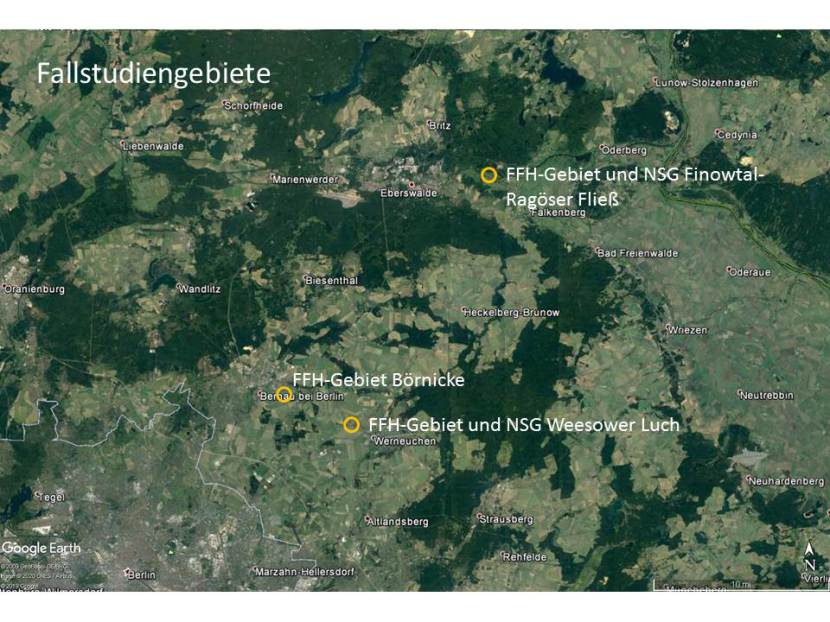Januar 2020 - Einrichtung des Fachbeirates
January 2020 - establishment of the advisory board
Am 9. Januar wurde der dritte interne Workshop mit Mitarbeitern des Zentrum für Ökonik und Ökosystemmanagement durchgeführt, um die MARISCO-Methodik zu überarbeiten und die Funktionen für die geplante Software zusammenzustellen.
Außerdem wurde am 15. Januar ein Treffen zur Einrichtung des Fachbeirates für das Projekt an der Hochschule für nachhaltige Entwicklung Eberswalde (HNEE) durchgeführt, um das Projekt inhaltlich zu begleiten. Der Fachbeirat besteht aus Vertretern der DBU, der Stiftung NaturSchutzFonds Brandenburg, dem Wasser- und Bodenverband "Finowfließ", der Stadt Bernau und der unteren Wasserbehörde Landkreis Barnim.
Besprochen wurde, dass im Projekt die MARISCO-Methodik für die Anwendung im Wassermanagement weiterentwickelt und modellhaft für drei Gewässersysteme in Brandenburg im Rahmen von Workshops angewendet werden soll. Dabei soll die Methodik überarbeitet werden, es soll ein Austausch mit Projektpartnern und Akteuren stattfinden sowie die Methodik dementsprechend angepasst und eine dazugehörige Software entwickelt werden. Die zu erarbeitenden Produkte im Projekt umfassen die erweiterte MARISCO-Methodik für das Wassermanagement sowie die MARISCO-Software. Weiterhin soll ein Leitfaden zur Methodik erstellt und Empfehlungen für das Wassermanagement in den Fallstudiengebieten (basierend auf den Workshopergebnissen) herausgegeben werden. Parallel dazu soll erreicht werden, dass sich die Projektpartner und beteiligten Akteure in systemischer, nachhaltiger Arbeitsweise weiterqualifizieren.
Mit der überarbeiteten Methodik und der Software soll das Management von Ökosystemen und ihren Wasserkörpern als komplexe Systeme erleichtert werden. Es soll ein ganzheitlicheres und anpassungsfähigeres Wassermanagement in das Management des umgebenden Ökosystems bzw. der umgebenden Ökosystemen integriert und in die Praxis getragen werden. Durch die Partizipation im Projekt sollen Akteure ermutigt und befähigt werden, mit Komplexität umzugehen.
Bei diesem Treffen wurden auch die drei Fallstudiengebiete festgelegt: das FFH-Gebiet Finowtal-Ragöser Fließ im Landkreis Barnim, Landkreis Märkisch-Oderland und im Biosphärenreservat Schorfheide-Chorin gelegen, das FFH-Gebiet Börnicke – im Landkreis Barnim und teilweise im Stadtgebiet Bernau bei Berlin gelegen und das FFH-Gebiet Weesower Luch, das sich auch im Landkreis Barnim befindet. Speziell in den Fallstudiengebieten wird durch diese Arbeitsweise ein Mehrwert für das Wassermanagement und den Naturschutz erzeugt und soll langfristig in funktionale Ökosysteme münden, die den Erhalt der biologischen Vielfalt sowie eine ökosystembasierte Anpassung an den Klimawandel ermöglichen.
Die Entwürfe der überarbeiteten Methodik und der geplanten Software werden im weiteren Verlauf des Projektes vorgestellt.
On January 9, the third internal workshop was held with employees of the Centre for Econics and Ecosystem Management to revise the MARISCO methodology and to put together the functions for the planned software.
In addition, a meeting was held on January 15 to set up the advisory board for the project at the University for Sustainable Development
Eberswalde (HNEE) to support the content of the project. The advisory board consists of representatives of the DBU, the Foundation NaturSchutzFonds Brandenburg, the water and soil association
"Finowfließ", the city of Bernau near Berlin and the lower water authority of the Barnim district.
It was discussed that the project would further develop the MARISCO methodology for use in water management and to apply it in workshops as a
model for three water systems in Brandenburg. The methodology is to be revised, an exchange with project partners and actors is to take
place, the methodology is to be adapted accordingly and the associated software is to be developed. The products to be developed in the project include the extended MARISCO methodology for water
management and the MARISCO software. Furthermore, a methodological guide is to be drawn up and recommendations for water management in the case study areas (based on the workshop results) are to be
issued. At the same time, the aim is to foster that the project partners and stakeholders further qualify in a systemic, sustainable way of
working.
The revised methodology and software are intended to facilitate the management of ecosystems and their water bodies as complex systems. A more
holistic and adaptable water management should be integrated into the management of the surrounding ecosystem or the surrounding ecosystems and put into practice. Participation in the project should
encourage and enable actors to deal with complexity.
The three case study areas were also determined at this meeting: the FFH area Finowtal-Ragöser Fließ in the Barnim district, Märkisch-Oderland
district and in the Schorfheide-Chorin biosphere reserve, the Börnicke FFH area – located in the Barnim district and partly in the urban area of Bernau near Berlin and the FFH area Weesower Luch,
which is also located in the Barnim district. In the case study areas in particular, this way of working creates added value for water management and nature conservation and should lead to functional
ecosystems in the long run that enable the preservation of biological diversity and an ecosystem-based adaptation to climate change.
The drafts of the revised methodology and the planned software will be presented in the further course of the project.



